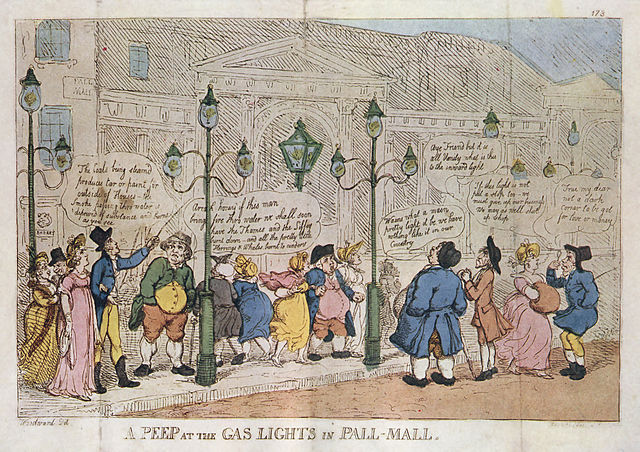An old saying goes “the Brits may have invented English, but the Irish perfected it.” Or maybe that refers to stout. Either way, there is truth to the sentiment: Ireland (besides providing the language with some of its most colorful dialects) produced Joyce, Shaw, Wilde, Beckett, Behan, O’Casey, Synge, Boucicault, Yeats, and Swift. A tall order for an island slightly smaller than Maine.
But were the Irish responsible for the quintessentially British phenomenon known as Cockney rhyming slang? It’s a notion I’ve seen repeated several places. Here’s the basic jist, from the Linguistics 101 textbook An Introduction to Language:
Another view is that during the building of the London docks at the beginning of the century, the Irish immigrant workers invented rhyming slang to confuse the non-Irish worker.
And here it is again, in lexicographer Jonathan Green’s article on the subject from Critical Quarterly:
Peter Wright, in Cockney Dialect and Slang (1981) … suggests a large input from the Irish navvies, recently imported to England to build railways and canals. According to Franklyn it was the linguistic rivalry between these navvies, and similarly recruited Cockneys, who worked alongside them and like them revelled in language, that created rhyming slang.
Green is aware that, given that rhyming slang is infrequent in Irish dialects, the theory is questionable. The problem with seeking the roots for rhyming slang, in my opinion, is that rhyming is such a universal pleasure that I’m surprised similar slang hasn’t popped up around the globe of its own accord.
Oh wait, it has. Caló, a type of argot in Southwestern US Mexican Spanish also relies on rhymes. They tend to be more of the “See you later, Alligator,” variety, as in the phrase “Al rato, vato.” Yiddish-English also contributed a type of rhyming slang to the American idiom, whereby in order to dismiss something, you follow an operative word with a rhyming nonsense word. For instance, this conversation I once heard between two friends:
Person A: I dunno. He’s really nice, and I don’t want to hurt his feelings.
Person B: Nice schmice. Do you even like the guy?
Which is why, getting back to the Irish question, I don’t find the Cockney rhyming slang’s origins as interesting as what separates it from other such slangs. Specifically, Cockney rhymers entirely replace the word being expressed with the rhyme, or in more extreme cases, replace the word with the first element of a rhyming compound (Hence “I’m going up the apples” meaning “I’m going up the stairs”).
Still, might rhyming slang have Irish roots?



Well, there is the (fictional) South Dublin, Ross O’Carroll-Kelly rhyming slang, though I don’t think it reflects much actual real-life usage:
“Jo (Maxi)” = taxi
“Allied Irish (Bank)” = wank etc.
(I’d also add R.B. Sheridan, Bram Stoker, and Maeve Binchy…:) )
Well I have head people call the LUAS (Tram) the “Daniel Day” for example, of course this ties in with some Dubliners mispronunciation of it so that it sounds like Lewis.
-Paul
> or in more extreme cases, replace the word with the first element of a rhyming compound
I think that’s the canonical version of rhyming slang, not the extreme version. Part of the fun is its obscurity: the slang doesn’t actually rhyme with the thing it represents; you have to derive it via some compound or related word.
We do this a bit in Australian English too, but we undoubtedly got it from the Cockneys.
I think you’re correct about that, it’s more known for eliminating the rhyming component entirely. That’s why I find it interesting as a kind of “function creep” (to borrow tech parlance) in slang.
Then there’s the Dublin tradition of rhyming names for statues etc – the floozie in the Jaccuzzi, the tart with the cart, the time in the slime, being a few of the best known.
Interesting, never heard about that one before. Reading the wikipedia article, it seems there are five such rhymes for the Molly Malone statue alone!
i was thinking about this the other day, because I realized we had some local rhyming slang (I’m in Seattle). It was something where we totally only say the rhyme… it’s escaping me at the moment, but I’ll post it here when I remember….
this is not the cockney rhyming slang-like thing I was thinking about in my comment above, but I just remembered that in college we had a thing for renaming the (pretty lowbrow) restaurants that we went to with funny (and mostly insulting rhymes):
Pizza Hut/Pizza Slut
Pizza Answer/Pizza Cancer
Pizza Time/Pizza Crime
Taco Bell/Toxic Smell
Jack in the Box/Jack in the Crack
Skipper’s/Skip-whores
Yes, immature, I know. There are several others I can think of, many much more clever than those listed above, but the ones I listed above are the ones we actually used in conversation (and not just awesome ones I dreamt up and have been waiting to drop at just the right moment).
We also refer to the Tri-Cities as the “Dry Shitties.”
Really though, I did have a good example of rhyming slang that comes from this area that’s not just obnoxious college kids… I just have to remember it….
Pingback: Link love: language (46) « Sentence first